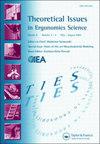Concerns and needs of research participants with visual disabilities amid the COVID-19 pandemic
IF 1.4
Q4 ERGONOMICS
引用次数: 1
Abstract
Abstract As COVID-19 is contagious, researchers stop or delay the data collection requiring in-person meetings with research participants. Potential research participants may consciously or unconsciously change the perspective about human subjects research, probably leading to developing reluctance to participate in it. This study aims to advance knowledge of how potential research participants develop, sustain, and/or change their perspective towards human subjects research during the COVID-19 pandemic as well as how to adequately address their needs and concerns. A convenient sample of 28 participants with visual impairments and blindness completed a phone interview. The interview data were analyzed via open coding, axial coding, and selective coding. The data analysis resulted in 7 main themes and 10 subthemes that covered the study preparations and procedures. We referred to Rogers’ Diffusion of Innovation Theory to discuss a set of facilitators to resolve potential participants’ uncertainty and concern about participating in human subjects research.2019冠状病毒病大流行期间视力障碍研究参与者的关注和需求
摘要由于新冠肺炎具有传染性,研究人员停止或推迟了需要与研究参与者进行住院会议的数据收集。潜在的研究参与者可能会有意识或无意识地改变对人类受试者研究的看法,可能会导致他们不愿参与其中。本研究旨在提高对潜在研究参与者如何发展、维持、,和/或改变他们对新冠肺炎大流行期间人类受试者研究的看法,以及如何充分解决他们的需求和担忧。一个方便的样本,28名有视觉障碍和失明的参与者完成了电话采访。访谈数据采用开放编码、轴向编码和选择性编码进行分析。数据分析产生了7个主题和10个子主题,涵盖了研究准备工作和程序。我们参考了罗杰斯的创新扩散理论,讨论了一组促进因素,以解决潜在参与者对参与人类主体研究的不确定性和担忧。
本文章由计算机程序翻译,如有差异,请以英文原文为准。
求助全文
约1分钟内获得全文
求助全文

 求助内容:
求助内容: 应助结果提醒方式:
应助结果提醒方式:


